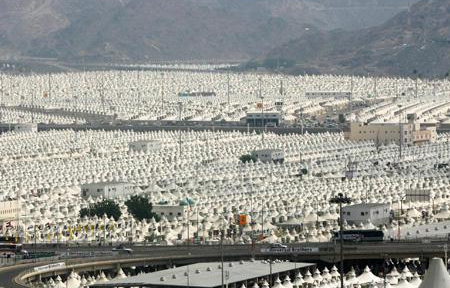
Jeddah, Sep 29: The move to shift government departments from Mina to a new administration complex in Muzdalifah would create 23 percent extra space in the tent city to accommodate 185,000 more pilgrims this year, said Sultan Al-Dossary, spokesman of the Makkah governorate.
The first phase of the complex has been completed on an area of 1 million square meters. Most of the non-essential government agencies would be shifted to the new facility, he said.
Al-Dossary said the project’s second phase would be implemented in due course to move the remaining government agencies from Mina within a few years. Makkah Gov. Prince Khaled Al-Faisal would inspect the new building complex on Monday. The complex, located on Muzdalifah’s borders, will have 13 buildings with 3,200 offices and housing units in addition to a helipad and a huge water tank with a capacity of 36,000 cubic meters of water.
More than 600,000 foreign pilgrims have already arrived for Haj that begins on Oct. 13. Nearly 2 million pilgrims are expected to take part in this year’s pilgrimage.
Prince Khaled has instructed 15 government agencies to take immediate measures to prevent possible flooding of roads leading to Makkah and other holy sites during this Haj season.
“Related government departments have to deploy enough manpower with the necessary equipment to deal with floods and protect pilgrims traveling through flood-prone routes,” a source said.
The Presidency of Meteorology and Environment has predicted the possibility of light rainfall in Makkah and Madinah during the Haj season. During the month of October, from 1985 to 2012, Makkah received rain for short periods followed by floods in some years, it said.
In its weather report for October, the presidency said temperatures in Makkah during the day would be hot, with pleasant weather at night. Temperatures would range from 38 to 43 Celsius at noon and 24 to 27 Celsius at night. Humidity would drop to 14 percent at noon and go up to 87 percent at night, it added.






Comments
Add new comment